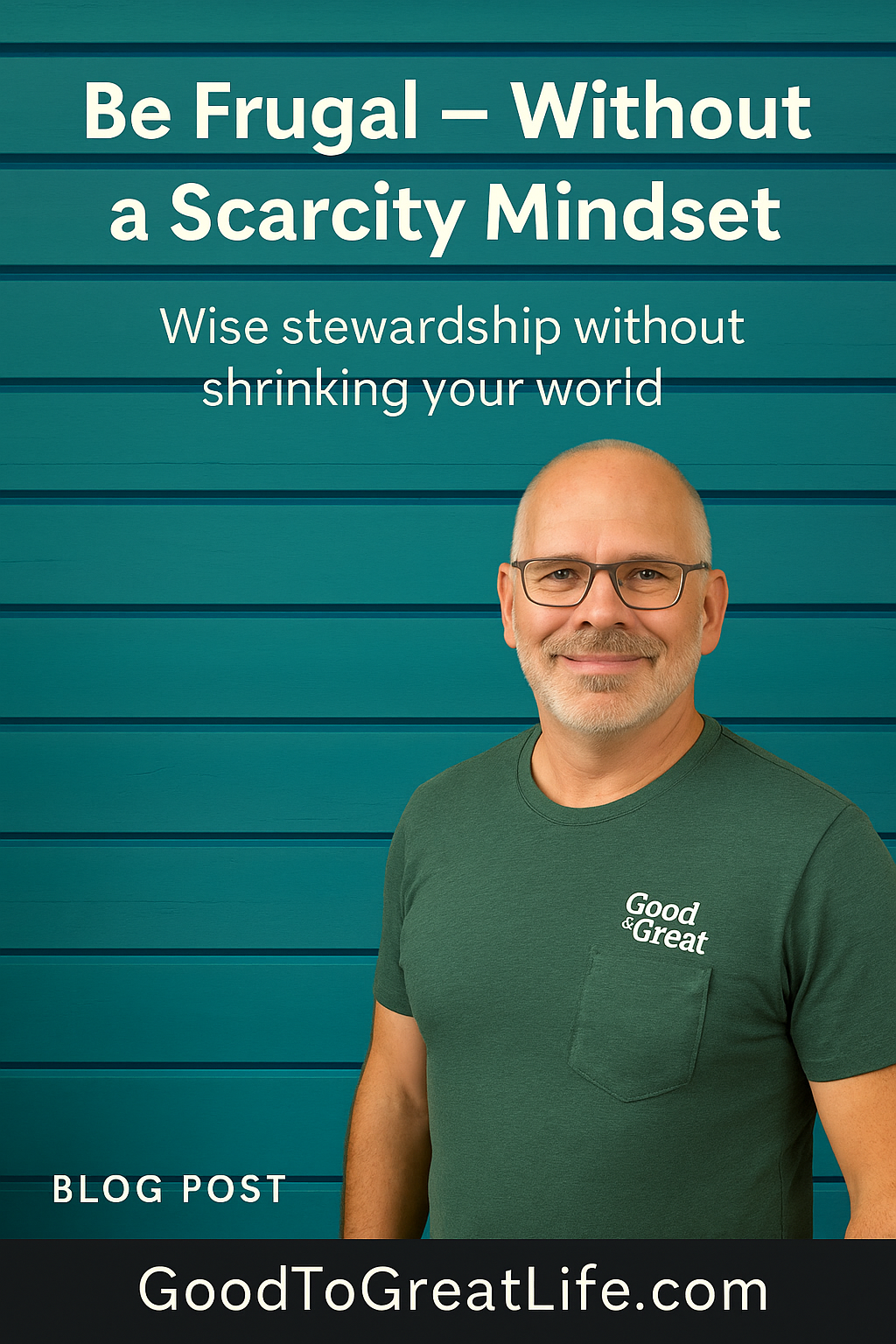- Nov 17, 2025
Be Frugal — Without a Scarcity Mindset
- Casey Cole Corbin
- Self-Sabotage VS Abundance
- 0 comments

Wise stewardship without shrinking your world
There’s a version of frugality that expands your life…
And a version that quietly shrinks it.
Most people have only been taught one:
“Spend less. Cut everything. Buy the cheapest. Fear every dollar leaving your account.”
But that’s not frugality.
That’s a scarcity mindset dressed up like discipline.
True frugality is something very different—much more grounded, much more practical, and honestly… much more empowering.
Let’s talk about the difference.
Healthy Frugality Feels Like Choice
Healthy frugality says:
“I choose where my money goes.”
“I’m intentional, not afraid.”
“I steward my resources so I can build a life that fits me.”
And here’s a principle I live by:
Barter first. Borrow second. Buy last.
You’d be surprised how often those first two options solve the problem without spending anything at all.
And when you do buy, you do it intentionally—matching quality with purpose.
Healthy frugality isn’t about restriction.
It’s about alignment.
My Personal Hierarchy: The 4 Rs
If you want to live frugal without slipping into scarcity, here’s a simple order to adopt:
1. Primary use
Use items for what they were made for, for as long as they were made to last.
2. Reuse
Use the same item again—no modification needed.
3. Repurpose
Turn it into something new that still has value.
4. Recycle
Only recycle when it’s at the absolute end of its life.
You’ll be shocked how much money you save (and waste you prevent) when you follow this hierarchy with intention instead of fear.
Where Frugality Turns Into Scarcity
Scarcity has a different energy.
It’s tight.
Constricting.
It says:
“Don’t spend or something bad will happen.”
“There’s not enough.”
“If I buy anything, I’m unsafe.”
Scarcity is the place where self-sabotage is born—because fear-based decisions always cost more in the long run.
Healthy frugality creates a fuller life.
Scarcity creates a smaller one.
The Myth of Cheap: Why Low Cost Isn’t Always Frugal
Frugal is not the same as cheap.
In fact, going “cheap” often ends up being the most expensive choice of all.
Here’s a real example I love:
**A $300 pair of shoes that lasts 15 times longer than $30 shoes…
is more frugal than 15 cheap pairs that each fall apart.**
You spend more once,
save more long-term,
and avoid the constant churn of replacing junk with more junk.
The same applies everywhere:
Better tools → fewer replacements
Better clothing → less waste
Better appliances → lower long-term cost
Better education → fewer mistakes
Frugality is about total value, not total fear.
Frugal Eating: Another Big Misunderstanding
One of the most overlooked truths:
Nutrient-dense food is more frugal than cheap, empty calories.
You don’t need to be a gourmet chef to understand this.
Whole foods last longer in your body
They give more sustained energy
You think better
You feel better
You perform better
This is why I haven’t eaten at McDonald’s in years.
(Okay… except their coffee. Let’s be honest. It’s reliable and everywhere.)
Healthy frugality upgrades your inputs so your whole life functions better.
One Quick Heart Check: “Am I Choosing From Fear or From Wisdom?”
Don’t overcomplicate it.
Just ask:
Does this decision feel like fear…
or does it feel like wisdom?
Fear is tight.
Wisdom is calm.
Fear avoids.
Wisdom chooses.
Fear hoards.
Wisdom allocates.
Fear distrusts the future.
Wisdom trusts that provision flows—whether you call that God, timing, or simple cause-and-effect.
You can feel the difference.
Frugality That Supports Your Identity
When frugality is healthy, it makes you feel:
grounded
capable
confident
resourced
aligned with your goals
Healthy frugality is identity-based.
Scarcity, on the other hand, creates an identity you were never meant to inhabit—one rooted in fear, insufficiency, and “not enough.”
The Reframe That Changes Everything
Frugality is not restriction. Frugality is direction.
It’s choosing:
sustainability
quality
nourishment
value
intentionality
alignment
It’s building a life that feels good on the inside, not one that looks shaky on the outside.
And it’s doing all of it without slipping into fear, guilt, or pressure.
A Final Encouragement
You are not behind.
You are not failing at money.
You’re learning a new way to live—one that honors your goals, your peace, and your future.
Frugal is wise.
Scarcity is fearful.
And you don’t need fear to guide you anymore.